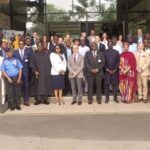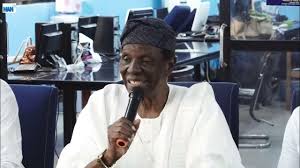By Philomina Attah
Former NTA Director-General, Prof. Tonnie Iredia, has urged journalists to remain professional, embrace innovation, and continuously improve their skills to stay relevant in the fast-evolving media industry.
Iredia said this during an interactive session with staff of the News Agency of Nigeria (NAN) in Abuja.
He stressed that manpower development was critical, saying journalists must adapt to emerging technologies and new trends, while avoiding the “robotic mentality” of sticking to outdated practices without independent thought or creativity.
“Those who say ‘this is how we have been doing it’ are robots,” Iredia said, noting that such journalists lacked discretion, critical thinking, and the ability to innovate, which are essential qualities in modern newsrooms.
He encouraged journalists to embrace technology, seek better methods, and experiment with innovative storytelling techniques, emphasising that progress in journalism required consistent effort, adaptability, and openness to learning from changing industry dynamics.
Iredia highlighted the importance of apolitical reporting, courage, and consistency, noting that journalists must maintain professionalism while holding power accountable, relying on facts rather than personal opinion or external influence in their reporting.
Sharing experiences as NTA D-G, he underscored proper training, education, and adherence to professional standards, urging journalists to find ways to make stories engaging and impactful while maintaining high productivity levels.
He recounted challenges of government interference during his tenure, reinforcing the need for boldness, fearlessness, and editorial independence to report truthfully and ensure accountability in governance and public service.
Comparing past and present media landscapes, Iredia said modern technology was advanced, but manpower development and subject-matter expertise remained superior in older media, highlighting the continuing need for rigorous training in contemporary newsrooms.
He expressed concern over insufficient training opportunities, stressing that meaningful progress depended on improved productivity, and advised NAN leadership to expand its operational scope beyond the print-oriented model inherited from predecessors.
Iredia highlighted his initiative of deploying NTA staff to train NAN personnel in radio and television news production, contributing to NAN’s emergence as a multi-platform, versatile news organisation.
Iredia said journalists should not aim to “tell truth to power,” emphasising that the role was to report accurately and draw government attention to societal issues.
NAN Managing Director, Malam Ali Muhammad Ali, describing Iredia as a thought leader, said journalists should focus on highlighting societal ills rather than presenting personal opinions to those in power.
Ali said the session aimed to explore “telling truth to power,” but Iredia’s correction reframed it as drawing attention to society’s challenges and holding authorities accountable through factual reporting.
He added that modern media required multi-skilling and continuous training, with journalists expanding knowledge across disciplines to provide comprehensive, accurate, and impactful coverage for audiences across platforms.
Ali noted that NAN recently held its first retreat in years to address training and skill gaps, urging staff to remain steadfast, avoid proxy wars, and resist undue criticism while performing their duties.
He encouraged journalists to emulate Iredia’s legacy of courage, knowledge, and professionalism, reinforcing that continuous learning, innovation, and ethical reporting were essential to the growth and credibility of the journalism industry.
The interactive session offered NAN staff a valuable opportunity to learn from Iredia’s experiences, gain insights into best practices, and understand the importance of adaptability, multi-skilling, and professional excellence in journalism. (NAN)(www.nannews.ng)
Edited by Abiemwense Moru












